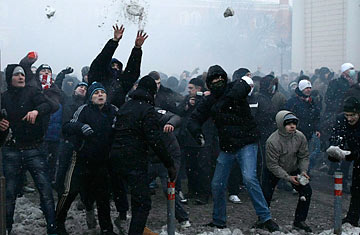
Protesters throw pieces of snow and ice as they clash with police in central Moscow on Saturday, Dec. 11, 2010. Some hundreds of people gathered in the center of the city to protest the shooting death of a soccer fan Yegor Sviridov, 28, who was killed on Dec. 6, 2010, in an attack on soccer supporters.
Around dusk on Dec. 11, Moscow's police chief, Vladimir Kolokoltsev, arrived at the scene of a race riot that his troops had failed to quell. Mobs of skinheads had savagely beaten dozens of passersby that afternoon in the streets and on the subway, leaving blood on the ground and swastikas scrawled on the walls across from the Kremlin gates. As Kolokoltsev stood there, thousands of rioters were still chanting racist slogans and throwing bottles and flares at his men. He decided it was time to negotiate.
For a police force not known for being shy with its truncheons, this was an unprecedented move, and it has solidified the growing belief among the Russian public that the authorities are either unable or unwilling to stop the recent wave of violence being perpetrated by the country's nationalists. "It was basically admitting defeat," says Evgeny Valyaev, the shaven-headed leader of supremacist group Russky Obraz, whose members took part in Saturday's riots. "They shouldn't have provoked us. That was their mistake. So Kolokoltsev was forced to negotiate with a man in a black mask," he told TIME in an interview Monday.
That little talk, which was captured by news cameras, appeared to define the tone that Russian law enforcement decided to take during the worst ethnic violence to hit Moscow in years: a far gentler tone than most expected. Of the 5,000 protesters who took part in Saturday's demonstration, only 65 were arrested, and all of them were released by the following day. Even though the protesters had no permission to rally, no effort was made to disperse the crowd until it turned violent. And, inexplicably, Interior Minister Rashid Nurgaliyev went on television hours after the violence and blamed it on "a provocation from left-wing radicals," leaving many puzzled as to where he had seen the influence of communists at a neofascist event.
All of this seemed to infuriate President Dmitri Medvedev, who felt obliged to state the obvious on Monday at a meeting of Russia's top cops. "The recent events in Moscow — the riots, the attacks against people — should qualify as crimes, and the people who committed them should be punished," said a visibly angry Medvedev. The general prosecutor's office then announced it had opened 11 criminal cases (mostly for "hooliganism"), even though a total of 32 people, including police officers, sustained serious injuries during the violence.
For Russia's rights activists, this response comes off as only the latest sign of police complicity in the nationalist subculture. In August, Viktor Lukonin, a major in the Federal Protective Service, was charged with leading an ultra-nationalist gang responsible for arson attacks and bombings in the western region of Oryol. He denies the charges. But Elena Tyuryukanova, Russia's leading defender of migrants' rights, sees his case as part of a broader trend. "Xenophobic sentiment is building, the pressure is rising, and our police forces show that they either cannot control it, or do not want to," she says. "Now we're faced with a situation where people are afraid to go into the streets, and at the same time, they can't turn to the police for help. They feel totally unprotected."
And nationalists tend to feel the opposite. On Wednesday, they are set to stage another demonstration at Moscow's Kievsky train station, home of a huge flower market run mostly by immigrants from the Caucasus region. If the immigrants come armed, says Russky Obraz leader Valyaev, "it could look more like a war than a riot."
The pretext for the coming demonstration, like the one that sparked Saturday's riot, is the murder of Yegor Sviridov, a 28-year-old Russian killed in a street brawl with a group of men from the Caucasus on Dec. 6. Sviridov was a member of a fan club for Moscow's leading soccer team, Spartak, and his death has galvanized Russia's huge community of soccer fanatics, many of whom are also involved in the nationalist movement. At Saturday's rally, and at several previous ones calling for justice in the Sviridov case, the soccer fans made up the bulk of the crowd yelling racist chants.
"These soccer movements are undergoing a crisis," says Pavel Zyryanov, a member of the Russian parliament's committee on youth policy. "They have become a place where nationalists and radicals can organize. I've been to games with them, and it's not rare to see Nazi symbols, chairs ripped out of the stands, all kinds of madness."
On Monday, the leaders of Russia's soccer-fan associations denied their links to the radical right, and senior government officials have also claimed the two movements are not connected. But according to Valyaev, nationalists have become "completely intertwined" with the soccer movement in recent years, swelling the ranks of groups like his. "We've reached the point where the leadership [of the soccer clubs] will have to accept the nationalist cause," he says. "Or most of the fans will simply break away from those organizations and start their own."
If he turns out to be right, nationalist groups will easily be able to field thousands of protesters whenever they please, and the government will have to come up with better ways of controlling their baser instincts. For now, Prime Minister Vladimir Putin has not even commented on Saturday's violence, nor has Moscow's new mayor, Sergei Sobyanin. But the image of the police chief meekly chatting with a rioter in a balaclava is a sign of victory to Russia's neo-Nazis. It's little wonder they now seem high on their own impunity.
